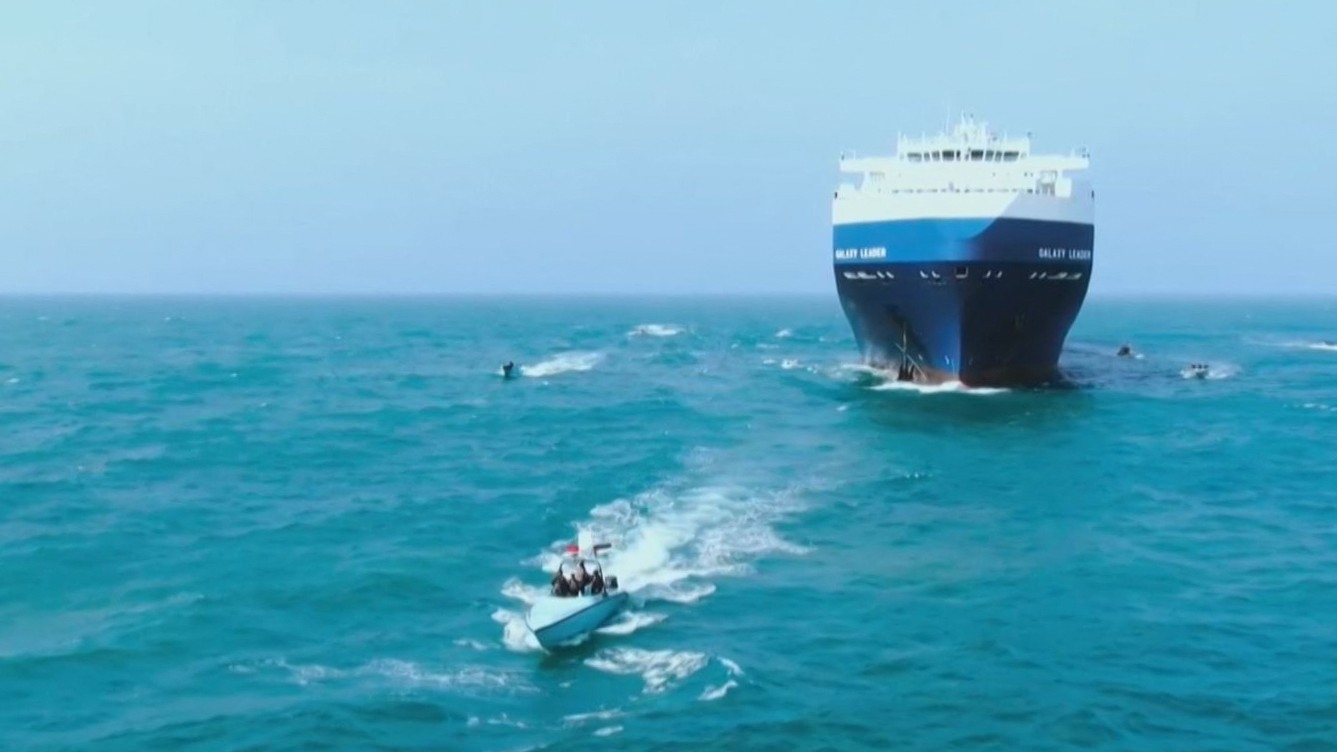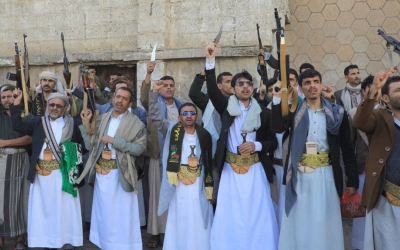Israel-Palestine war: Why Arab states are steering clear of anti-Houthi naval task force

The US launched a multinational naval task force to counter Houthi attacks in the Red Sea and Gulf of Aden on Monday. Observers were quick to notice it featured just one country from the Middle East: Bahrain.
Ten nations were officially announced as participants: the US, UK, Canada, France, Italy, Netherlands, Norway, Seychelles, Spain and Bahrain. They are set to share maritime intelligence in the region and conduct joint patrols.
The naval group will be coordinated by the Combined Task Force 153 (CTF-153), a US-led initiative set up last April to provide maritime security in the Red Sea, Bab el-Mandeb and the Gulf of Aden.
Yemen's Houthis have carried out several attacks in recent weeks, targeting ships which it said were linked to Israel.
The Houthis said they would continue to target Israeli-linked vessels "until the Israeli aggression against our steadfast brothers in the Gaza Strip stops".
Stay informed with MEE's newsletters
Sign up to get the latest alerts, insights and analysis, starting with Turkey Unpacked
Last month, they seized cargo vessel Galaxy Leader, which is currently docked in the Yemeni port city of Hodeidah. A number of shipping giants, including Evergreen and BP, are swerving the Red Sea in fear of Houthi assaults.
A US defence official told the Associated Press that other countries agreed to be part of the US-led task force, but preferred not to be publicly named. The absence of Saudi Arabia and the United Arab Emirates, in particular, has raised eyebrows.
For Riyadh, its recent rapprochement efforts with the Houthis, and its close ally Iran, likely played a role.
“Saudi Arabia has been engaged for months in a difficult political process with the Houthis, with the goal of negotiating the terms of its defeat in Yemen and its withdrawal from the war,” Thomas Juneau, associate professor at the University of Ottawa, told Middle East Eye.
In March 2015, a Saudi-led coalition, which included the UAE, intervened on behalf of the Yemeni government to push back the Houthis after they took control of capital Sanaa. Eight years later, the two warring sides are now meeting publicly to talk peace.
Juneau said that an escalation in the Red Sea, with Saudi Arabia actively contributing to the anti-Houthi coalition, could open the country up to more Houthi attacks.
“This would be very damaging for [Saudi] Crown Prince Mohammed bin Salman, who has been investing significant effort in moving his country’s foreign policy away from the more confrontational stance of earlier years,” Juneau said.
The UAE, which has also been attacked by the Houthis in recent years, has similar fears.
'The US certainly doesn't have the same freedom to manoeuvre in the Gulf that it had prior to this war in Gaza'
- Andreas Krieg, academic
“We've seen in the past that the Houthis have that capability to strike the UAE directly,” Andreas Krieg, assistant professor at the Defence Studies Department of King's College London, told MEE. “That's a major security concern in Abu Dhabi at the moment.”
Eleonora Ardemagni, senior associate research fellow at the Italian Institute for International Political Studies, believes Arab and Gulf states will take a “wait and see approach”.
She notes that the new task force is under the umbrella of CTF-153, which most US allies in the region are part of.
Bahrain, Egypt, Iraq, Jordan, Kuwait, Oman, Qatar, Saudi Arabia, Turkey, the UAE - and even Yemen (under its internationally recognised government) - are among 39 member nations in the Combined Maritime Forces.
“Since nobody wants to be in the sights of attacks by the Houthis or other Iranian-backed groups, it is likely they are opting for keeping a low profile, maybe providing only intelligence support to the operation,” Ardemagni told MEE.
'Bahrain is most anti-Iran Gulf country'
For Bahrain, its close naval coordination with the US is likely to have contributed to its willingness to publicly participate.
Ardemagni noted that Bahrain hosts the headquarters of the US Fifth Fleet in the Persian Gulf, Red Sea, and Arabian Sea. She added that Manama collaborates with the US Navy on newly launched unmanned systems and artificial intelligence, and the two countries signed an agreement on security and defence earlier this year.

Bahrain’s limited involvement in Yemen's civil war, compared to its Saudi and Emirati neighbours, may have been a factor too.
“Its contribution to the new maritime task force will most likely be minor, given its small size,” Juneau said. “Its participation in the task force exposes it to Houthi retaliation far less.”
Ebrahim Sharif, a leading Bahraini opposition activist, was arrested after criticising Bahrain's participation in the task force in social media posts on X, the Bahrain Institute for Rights and Democracy said on Wednesday.
Unlike Riyadh, Bahrain still has no diplomatic ties with Iran. Both Manama and Riyadh cut ties with Tehran in 2016, but Saudi Arabia officially restored relations in March.
“Bahrain… is the most anti-Iranian GCC country,” said Krieg. “They've always positioned themselves very forcefully against Iranian interests.”
Following Tehran's rapprochment with Saudi Arabia, Iran even floated the idea of a naval alliance with Gulf nations. Such a move remains highly unlikely, particularly since the Houthis' escalation in the region's waters.
"Iran will undoubtedly propose the idea every now and then, but it is not a serious plan by any objective measure," said Juneau. "Saudi Arabia and Iran, despite a very modest easing of tensions in recent months, remain bitter rivals."
US losing legitimacy over Israel support
Aside from concerns about disrupting rapprochement with Yemen's de facto rulers in Sanaa, countries in the region will also be wary of appearing to oppose an act of Palestinian solidarity.
“They don't want to be seen as supporting Israel's war effort by positioning themselves against the Houthis,” said Krieg. “Public opinion in the Gulf has turned very hostile towards Israel and of the support from Western countries to Israel - especially the US.”
'The Saudi crown prince has been investing significant effort in moving his country’s foreign policy away from a more confrontational stance'
- Thomas Juneau, analyst
For Krieg, the lack of public participation from Arab states is more a legitimacy concern for Washington, than one of operational effectiveness of the task force.
“Public opinion in the Gulf has turned very hostile towards Israel and of the support from Western countries to Israel - especially the US.”
“The Gulf countries will reconsider how and on what occasion they will integrate with the US. So there will be a lot more picking and choosing,” he said.
“The US certainly doesn't have the same freedom to manoeuvre in the Gulf that it had prior to this war in Gaza.”
It's not the first sign of naval discontent with Washington in the region: the UAE said in May it was no longer taking part in US-led operations to protect Gulf shipping. It was believed to be due to perceived American inaction over Iranian seizures of tankers.
Juneau said for the new task force to be effective, the US would have to “take kinetic action and directly strike Houthi assets”.
“Doing this at a time of very high regional tension risks an escalation that the US and its partners mostly want to avoid,” he added.
Middle East Eye delivers independent and unrivalled coverage and analysis of the Middle East, North Africa and beyond. To learn more about republishing this content and the associated fees, please fill out this form. More about MEE can be found here.




